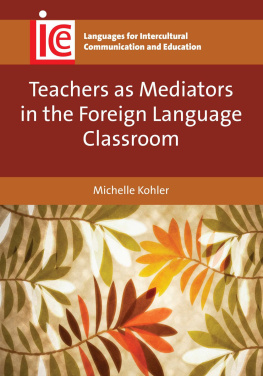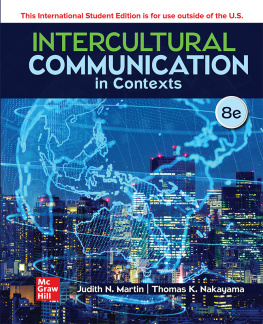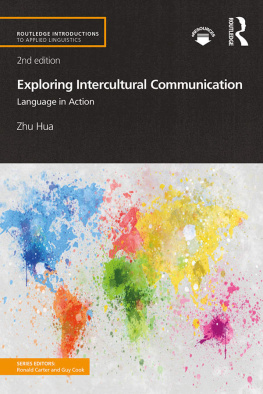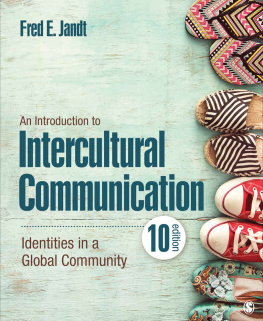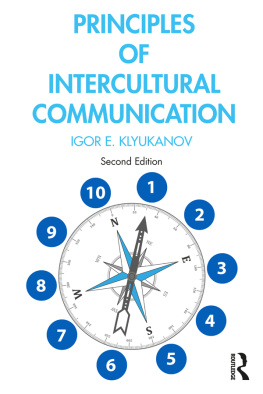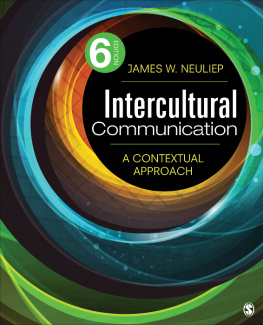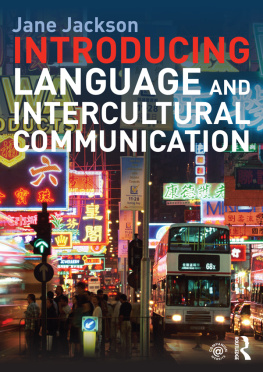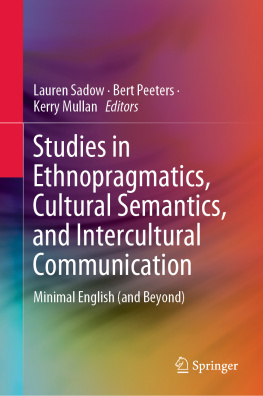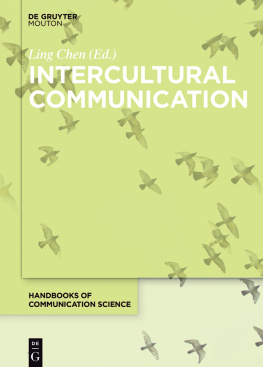Young Children as Intercultural Mediators
LANGUAGES FOR INTERCULTURAL COMMUNICATION AND EDUCATION
Series Editors : Michael Byram, University of Durham, UK and Alison Phipps, University of Glasgow, UK
The overall aim of this series is to publish books which will ultimately inform learning and teaching, but whose primary focus is on the analysis of intercultural relationships, whether in textual form or in peoples experience. There will also be books which deal directly with pedagogy, with the relationships between language learning and cultural learning, between processes inside the classroom and beyond. They will all have in common a concern with the relationship between language and culture, and the development of intercultural communicative competence.
Full details of all the books in this series and of all our other publications can be found on http://www.multilingual-matters.com, or by writing to Multilingual Matters, St Nicholas House, 31-34 High Street, Bristol BS1 2AW, UK.
Languages for Intercultural Communication and Education: 26
Young Children as Intercultural Mediators
Mandarin-speaking Chinese Families in Britain
Zhiyan Guo
To children and parents migrating in the world
Library of Congress Cataloging in Publication Data
A catalog record for this book is available from the Library of Congress.
Guo, Zhiyan, 1971-
Young Children as Intercultural Mediators: Mandarin-speaking Chinese Families in Britain/Zhiyan Guo.
Languages for Intercultural Communication and Education: 26
Includes bibliographical references and index.
1. Bilingualism in childrenGreat Britain. 2. Intercultural communicationGreat Britain. 3. Children of immigrantsLanguageGreat Britain. 4. Translating and interpretingGreat Britain. 5. Chines e Great BritainLanguages. 6. Mandarin dialectsGreat Britain. I. Title.
P115.5.G7G86 2014
305.7951041dc23 2014003588
British Library Cataloguing in Publication Data
A catalogue entry for this book is available from the British Library.
ISBN-13: 978-1-78309-213-0 (hbk)
ISBN-13: 978-1-78309-212-3 (pbk)
Multilingual Matters
UK: St Nicholas House, 31-34 High Street, Bristol BS1 2AW, UK.
USA: UTP, 2250 Military Road, Tonawanda, NY 14150, USA.
Canada: UTP, 5201 Dufferin Street, North York, Ontario M3H 5T8, Canada.
Website: www.multilingual-matters.com
Twitter: Multi_Ling_Mat
Facebook: https://www.facebook.com/multilingualmatters
Blog: www.channelviewpublications.wordpress.com
Copyright 2014 Guo Zhiyan.
All rights reserved. No part of this work may be reproduced in any form or by any means without permission in writing from the publisher.
The policy of Multilingual Matters/Channel View Publications is to use papers that are natural, renewable and recyclable products, made from wood grown in sustainable forests. In the manufacturing process of our books, and to further support our policy, preference is given to printers that have FSC and PEFC Chain of Custody certification. The FSC and/or PEFC logos will appear on those books where full certification has been granted to the printer concerned.
Typeset by Deanta Global Publishing Services Limited.
Printed and bound in Great Britain by the CPI Group (UK Ltd), Croydon, CR0 4YY.
Contents
To complete this book, I have been very fortunate to receive support from a number of people. First of all, I must express my gratitude to Professor Mike Byram for his insightful and meticulous editing of the whole manuscript to transform it into a book, a process through which I have learned so much. I am very grateful to the reviewers at the different stages for their expertise, without which the book would not have its current shape. I also must thank Professor Helen Spencer-Oatey and Dr Annamarie Pinter for taking the time to share their experiences; without their encouragement, I would not have even crossed the first hurdle.
I am deeply indebted to Professor Nigel Hall and Professor Helen Colley who guided me through the adventure of my doctoral study, on which this book is based. Without their scholarship and academic rigour, the study would not have had its initial success. I was also very lucky to receive financial support from the Overseas Research Scholarship, which enabled the smooth completion of the study. I am so thankful to the eight children and the parents of the six families who allowed me to step into their family homes and permitted me to share their lives in the new world.
Finally, I am very grateful for my family, my husband Hua and my daughter Jintong (who has culturally mediated so much of my life in England) whose love and company have been indispensable during the whole process; and for my parents, my parents-in-law, my sister and brother in China, whom I see least in my migrant years, but whom I love most dearly.
I am a migrant with a 13-year-old daughter who goes to a local secondary school in the West Midlands in England. Having lived for nine years in a culture different from where I was born and brought up, I have been learning about it from my daughter. This constant, interesting learning experience was not only my original incentive for my doctoral study, completed several years ago and the basis for much of this book, but it also continued to drive me to share my experience and my studies with the wider world. Hence my desire to write this book.
My daughter was about four and a half years of age when she came to the UK. She did not know any English, but within a very short period of time, she had picked up English and spoke it with a Mancunian accent. She enjoyed her days at school and settled in very well. I came to the UK in pursuit of a doctoral degree. I had started learning English as a subject in secondary school, got my first degree in English education and have used English for my work ever since. Although I thought I had learned a lot about the language and culture during my stay in the UK, I found myself learning continuously from my daughter about British culture as well as the language. This learning started almost from her first day at school: from listening to her telling me about her day, reading storybooks with her and even supporting her participation in social activities. It happened so frequently in my everyday life and covered such a wide range of topics that I could not help but be intrigued and amazed.
My awareness of learning from my daughter became so strong that I shared this experience with my friends who are also (im)migrant parents. I was surprised to find that I was not the only parent with such an experience. They told me different anecdotes of learning from their children about various aspects of British society. Some of them had followed their childrens advice, carrying out cultural practices that they had never done before in their home countries. All these personal experiences offered me food for thought about this social and cultural phenomenon in im/migrant families.
Almost at the same time, I attended an Educational and Social Research Council (ESRC) seminar series on child language brokering coordinated by Professor Nigel Hall. The discussions there equipped me with theoretical approaches developed in the new childhood studies that emphasise childrens active and agentive roles in their social life. A number of studies on language brokering provided me with a valuable starting point for my literature search and review. Taking language brokering as an explicit form of child cultural mediation, I started exploring this cultural phenomenon in immigrant or refugee families. In order to see how parental learning from children occurs, I recognised that it would be ideal to observe the daily life of families, and ethnography appeared to be an appropriate methodological pathway. As a Mandarin speaker myself, it was also easier for me to focus on the Chinese community and with acquaintances who had similar experiences to my own, access to sites for fieldwork became manageable. I will place the discussion of the methodological issues in the Appendix for interested researchers and now tell the story of child cultural mediation.


